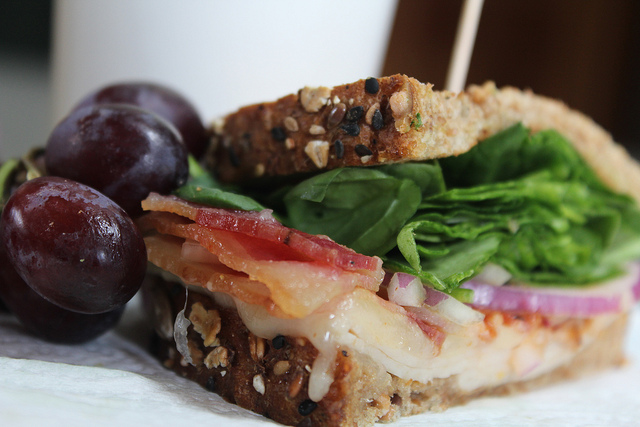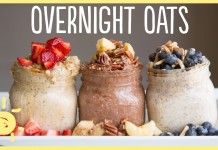The Best Carbohydrates for Muscle Gain and Fat Loss
Carbohydrates are a dirty word in fitness right? That’s what we are taught to believe. Yes, too much of the”bad”carbs are not OK, but you still need good carbs if you are training and in sports. Luckily there are tons of natural sources of carbohydrate available that are loaded with glucose as well as important micro-nutrients.
Starches are an Athlete’s Best Friend
Starch is a glucose polymer found in most plants that is chemically similar to our endogenous glycogen; it’s literally just a long chain of glucose molecules bonded together. Although humans have a tough time digesting the stuff raw, cooking breaks it down into pure glucose ready for utilization as a substrate to produce cellular energy throughout your body.
Of course, whatever you don’t use can be stored, preferably in your biceps, quadriceps or abdominals. While some of the most widely-consumed sources of starch (and thus glucose) are grains, like corn, wheat and rye, plenty of Paleo-friendly alternatives exist if that’s your thing. At the forefront, we have potatoes and carrots, as well as rice (preferably white), but let us not forget chestnuts and acorns that are rich in starchy energy.
Squash, peppers, zucchini and cauliflower round everything out and give you a wide palette of flavors to choose from. Now, it is completely up to you whether you munch on sweet potatoes instead of white potatoes, or white rice over brown rice. It’s worth considering however that the fiber content of potato skin, as well as the germ of brown rice, can slow digestion.
It’s not that big of a big deal. Most people don’t need to think about the rate of absorption and how it’s affected by added fiber, but it’s potentially disadvantageous in situations where we need to shoot for quick glucose uptake (like when you train twice a day). The most important take-away here is that you need dietary glucose to effectively replenish muscle glycogen.
Athletic Performance and Carbohydrates
When it comes to athletes and performance and their in-training fuel, carbohydrates remain vitally important just as they do in everyday meals and snacks. In order to maximize and optimize performance and recovery, athletes need to continually load and reload muscle glycogen stores. This process can not happen with a low-carbohydrate/high-protein diet. According to Ashley Chambers, M.S. and Len Kravitz, PhD, muscle glycogen is the primary fuel (followed by fat) used by the body during exercise.
Low muscle glycogen stores results in muscle fatigue and the body’s inability to complete high intensity exercise. The depletion of muscle glycogen is also a major contributing factor in acute muscle weakness and reduced force production. Both aerobic and anaerobic exercise decreased glycogen stores, so the need for carbohydrates is high for all types of exercise during this energy phase. Jeukendrup, PhD, and Michael Gleeson, PhD mention that there is convincing evidence from numerous studies indicating that carbohydrate feeding during exercise of about 45 minutes or longer can improve endurance capacity and performance.
So, what’s the take away?
Athletes looking for maximal and optimal mental acuity, performance, recovery, body composition change and meaningful and sustainable results for a lifetime, should avoid jumping on the bandwagon of the latest food fad and diet. When it comes to nutrition, there are three key components to be spot-on with when it comes to daily nutrition:The proper eating frequency.
1.Fuel up immediately upon awakening and then every 2.5-3.5 hours thereafter.
2. The proper nutrient timing.
When it comes to eating frequency and nutrient timing keep it simple. Being accurate with eating frequency and nutrient timing, helps assist the body in stabilizing blood sugar, insulin and serotonin levels. This will result in high and stable energy levels all throughout the day as well as reduced if not completely eliminated food cravings.
3.The proper macronutrient balance. At every meal/snack, seek the proper balance of carbohydrate-protein-fat. Maintaining a macronutrient balance at every meal/snack that contains 45-65% calories from carbohydrate, 15-30% calories from protein and 15-30% calories from fat will help to stabilize blood sugar, insulin and serotonin levels. This will help to properly load and reload muscle glycogen stores.
21 Days to a New You:
- Get 12-23 pound reduction in body weight
- Decreased cellulite
- Increased energy
- Lose 2-4 inches from your waistline
- Increased muscle tone
- Increase your metabolism
- 60 day money back guarantee!
All starting in 21 days from now!
Source: here
Source: here
Photo: source
[ulp id=”I1Mr4xcccmiFLCrG”]











